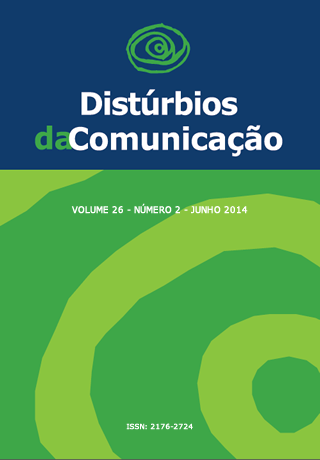Intellectual Disability Subjects: the role of language in family dynamics
Keywords:
intellectual disability, language development, family, language, mentally disabled personsAbstract
Objective: develop the comprehension of the role of language of intellectually disabled subjects in their family dynamics. Methods: this is a qualitative retrospective observational study, where there were analyzed the reports obtained in the context of a speech therapy group. There were carried transcriptions of video recordings of meetings of therapeutic groups for parents of intellectually disabled subjects. There were selected for analysis the accounts collected in three meetings, in which parents talked about their children’s language. The categories of analysis selected for this study were: the interest of mothers on language, the difficulty of understanding the children, the difficulty of being understood by children, and stigmatization. Results: it was found, by analyzing the results, that language is a topic of great interest for families, also because the language characteristics of these subjects strongly contribute to the stigmatization of them. It was also observed that the way parents are positioned in respect to their children language is related to how family relationships are established, with direct consequences for the development of persons with disability. Conclusion: the exchange of experiences among the group participants favored the (re)signification of their wishes, and of the vision of the potential of their children. Parents recognized the essential role of language as a social function, as well as its importance for the understanding between parents and children. The stigmatization of the subject with disability was present in all categories of analysis, suggesting that the meetings should be constant, encouraging exchanges and (re)significations.Downloads
Metrics
Downloads
Published
Issue
Section
License
Copyright (c) 2014 Maria Fernanda Bagarollo, Marcela Brugnerotto, Camila Morais Damiani, Ana Paula de Freitas, Evani Andreatta Amaral Camargo, Vanessa Veis Ribeiro, Ivone Panhoca

This work is licensed under a Creative Commons Attribution 4.0 International License.









